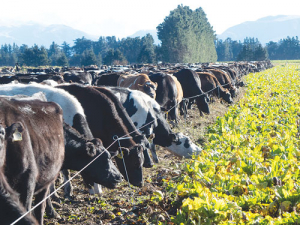AR37 scientist scoops award
A scientist instrumental in the development and commercialisation of the novel endophyte AR37 scooped the Ballance Agri-Nutrients Science and Research Award at Beef + Lamb NZ Awards last night.
 The project has found that farmers are increasingly using hill country forage crops and pastures to finish stock and that the increased erosion risk is being partly mitigated by farming practices.
The project has found that farmers are increasingly using hill country forage crops and pastures to finish stock and that the increased erosion risk is being partly mitigated by farming practices.
Sheep and beef farmers are increasingly finishing stock on hill country forage crops and pastures, with a resultant drop in erosion risk.
But some farmers had difficulty assessing the potential environmental impact and the financial return of hill country development, due to the unpredictability of sediment loss and the costs.
This was discovered by studies done as part of the Sustainable Hill Farming Tool project (SHiFT), says Paul Hulse, of Environment Canterbury (ECan).
The SHiFT project is to tell landowners the best ways to address these concerns, says Hulse.
“Three related studies were commissioned to better understand farmers’ hill country development practices,” he says.
“Initial interviews were held with 150 hill country farmers in Canterbury and Manawatu. This was followed up by in-depth interviews with 16 farmers, advisors and helicopter pilots, focusing on the use of helicopters for developing hill country land.
“And AgResearch reported on relevant research about the environmental impacts of forage cropping in hill country.”
The findings will be used to help develop a free advisory tool for farmers and advisors.
“ECan recognises that forage crops are important but they need to be managed so that sediment does not enter waterways.
“We’re expecting the tool to identify high and low risk areas on a property, estimate the potential sediment losses and provide a reference guide... so that sediment losses to waterways and estuaries can be minimised.”
Farm consultant Dave Lucock, of The Agribusiness Group, says farmers need to be aware of the risks in developing hill country and plan to avoid or mitigate those risks.
“It is no longer acceptable to have large quantities of sediment flowing from poorly managed winter feed paddocks.” Only about 50% of farmers consider sediment loss factors before developing their hill country, he said.
“We expect this tool will help farmers... to get the best results for their farm business and the local environment.”
The AgResearch review of research into soil losses from grazed forage crops showed the importance of block selection, and smart, timely decisionmaking to avoid soil loss. It also identified some of the success factors in hill country development.
Dr Seth Laurenson, author of the AgResearch report, says that the research review showed that management, in combination with climate, soil and slope, are important.
“The timing, duration and location of grazing animals relative to swales and gullies that act as overland flow paths is important for protecting waterways.
“Using riparian buffers and fencing to exclude stock from streambanks are all measures that can be included in a farm environment plan and are easily adapted as part of a farmer’s good management practices.”
Using helicopters to sow and spray hill country terrain requires good advice, he said. The survey found that farmers using heli-spraying do so because it is safer and more precise than using wheeled vehicles.
Animal disease management agency OSPRI has written off nearly $17 million after a botched attempt to launch a new integrated animal disease management and traceability system.
A free trade deal signed overnight with the Gulf Cooperation Council (GCC) is a boost for New Zealand’s red meat exports to the high-value market.
Farmer co-operative Ruralco has slumped to its second straight financial loss.
OPINION: Finally there's clarity for farmers around freshwater management regulations.
Always be on the lookout for new job opportunities and get outside your comfort zone.
In a landmark move, the state-owned farmer Pāmu (Landcorp) is making four of its 44 dairy farms available for people wishing to take up various contracts including herd-owning, share milking, variable order share milking and contract milking.